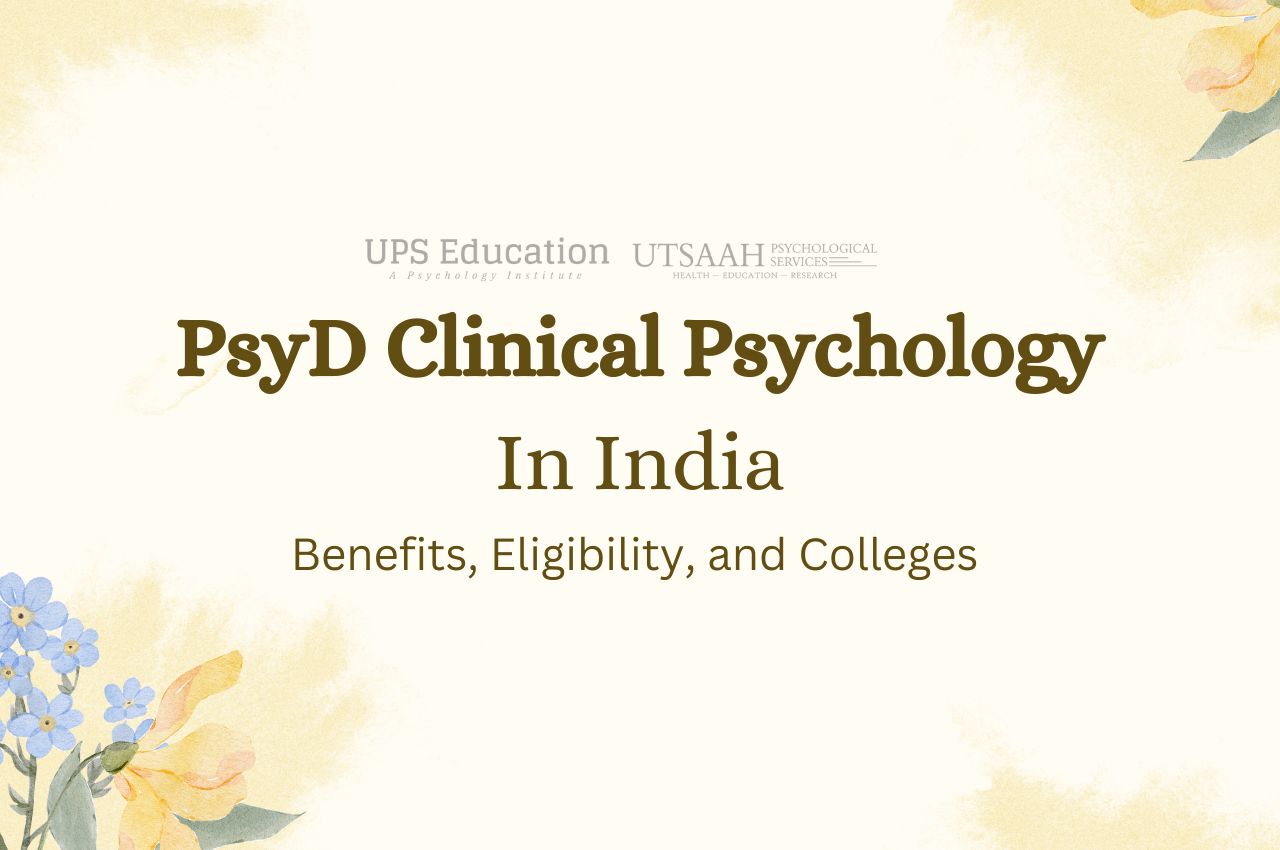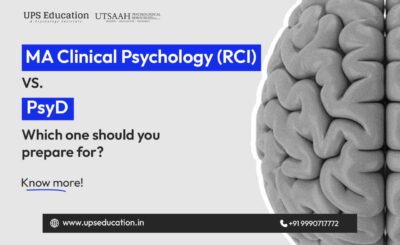To become a licensed Clinical Psychologist, a CRR number (license) from Rehabilitation Council of India is Important. The aspiring Clinical Psychologists can choose one of three RCI-approved courses: MPhil in Clinical Psychology, Professional Diploma in Clinical Psychology (PDCP), or PsyD Clinical Psychology to obtain an RCI license.
With the recent changes in M.Phil in Clinical Psychology, the PsyD program is now become a preferred choice for students aspiring to build a professional career in Clinical Psychology. In this article, we have covered everything about the PsyD Clinical Psychology program, including its structure, benefits, eligibility, colleges offering this course, and how it fits into the changes introduced by the RCI as per National Education Policy (NEP).
What is PsyD Clinical Psychology?
PsyD (Doctor of Psychology) in Clinical Psychology is a 4-year professional doctorate degree. It is designed for individuals aiming to practice as Clinical Psychologists. Unlike a normal PhD, which focuses more on research, the PsyD focuses more on clinical training and practical skills.
Completing the PsyD program provides an authoritative level of qualification and equips with the competence to assess, diagnose, and treat a wide range of behavioural and psychological disorders. PsyD graduates receive an RCI license as Clinical Psychologist that allow such individuals to work as Clinical Psychologists in various settings including hospitals, private clinics, schools, and rehabilitation centers.
Benefits of Pursuing a PsyD in Clinical Psychology
- RCI License: Graduates earn an RCI-recognized license to practice as Clinical Psychologists, making them eligible to work in diverse clinical settings.
- Doctorate Degree: Along with the license, students receive a doctorate degree, adding to their academic and professional credentials.
- Comprehensive Clinical Training: The PsyD program provides extensive hands-on training, focusing on real-world clinical practices.
- Direct Path to Professionalism: The PsyD is becoming a more streamlined path for students pursuing Clinical Psychology careers, especially with the upcoming changes in eligibility under NEP.
PsyD Admission – Eligibility Criteria
As of now, the eligibility criteria for PsyD Clinical Psychology include:
- A Master’s degree in Psychology or Clinical Psychology with at least 55-60% marks.
- An RCI-recognized M.Phil in Clinical Psychology in case of lateral entry.
However, from 2026, changes under the NEP will allow students with a 4-year Bachelor’s degree in Psychology to enroll directly in the PsyD program, this change will eliminate the need for a Master’s degree. This will shorten the academic path for aspiring Clinical Psychologists.
Colleges Offering PsyD Clinical Psychology in India
Currently, only three institutes in India offer the PsyD Clinical Psychology program:
- Amity University, Noida
- Amity University, Jaipur
- NIEPvD, Dehradun
With the increasing demand for Clinical Psychologists and upcoming changes in RCI guidelines, more institutes are expected to introduce this program in the near future.
With an expected change in the name & eligibility of MPhil in Clinical Psychology by 2026, PsyD programs are likely to become the popular route for obtaining an RCI license. This will not only increase the demand for PsyD programs but also encourage more colleges and universities to introduce this course.
Click here for Latest Psychology Admission Updates
Admission Process
The admission process for the PsyD Clinical Psychology involves the following steps:
- Entrance Exam: Students are required to appear in the MCQ based entrance test.
- Interview: Shortlisted candidates will be called for an interview to evaluate their aptitude and motivation for the program.
- Practical/Group Discussion: The next step is practical or group discussion. A final merit will be based on the score of all three stage.
Read More about PsyD Clinical Psychology Preparation
Difference between Clinical Psychology Professionals
| Diploma Holder (Associate Clinical Psychologist) | The competency level of Associate Clinical Psychologists could be placed at the level ‘Basic and Capable’. They are knowledgeable of the specified activity and its concepts. They can carry out standard relevant tasks confidently and consistently without supervision. With experience they may even supervise others. However, they are likely to need to seek advice before carrying out more complex or non-standard tasks. |
| Masters Qualified (Masters level Clinical Psychologists) | The competency of Masters level Clinical Psychologists could be at the ‘Accomplished and Expert” level. They are expected to have the knowledge and experience to carry out complex, specialist, or non-standard tasks confidently and consistently. They will be aware of alternative approaches and can provide guidance, instruction, and advice on the activity to others. |
| Psy.D Graduate (Doctoral level Clinical Psychologists) | The Competency level of Consultant Clinical Psychologists, qualified at the Doctoral level could be at the ‘Authoritative’ level. They will be widely recognized as trustworthy/authentic, in their own organization as well as by external peers, for the knowledge and experience they demonstrate. |






